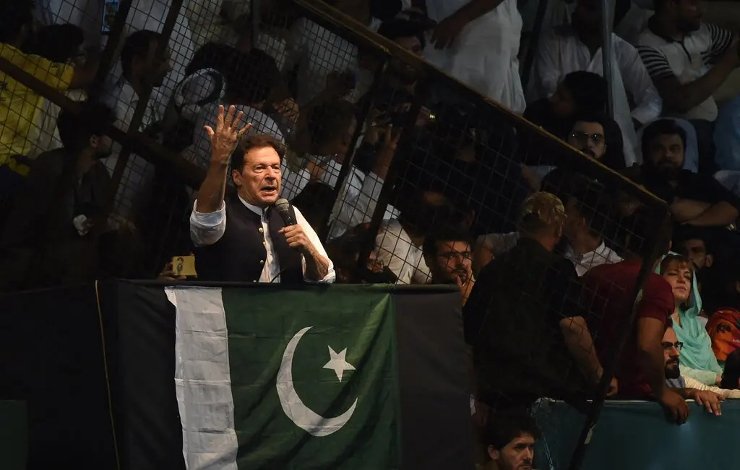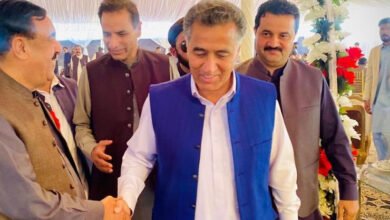Global experts, media outlets back Imran Khan’s call for civilian supremacy
Global experts and media outlets have backed the call of PTI chief and ex-PM Imran Khan for civilian supremacy in Pakistan.

Global experts and media outlets have backed the call of Pakistan Tehreek-e-Insaf (PTI) Chairman and former prime minister Imran Khan for civilian supremacy in Pakistan.
Imran Khan has become the centre of Pakistani politics globally after the registration of a terrorism case against him following his movement for civilian supremacy.
Here is a look at the global media outlets keeping a close eye on political developments in Pakistan:
Washington Post
Pakistan — Imran Khan, Pakistan’s former prime minister, has been charged under the country’s anti-terrorism act, the latest chapter in a tense struggle for power with Pakistan’s current government since his ouster.
Sunday’s move came a day after Khan addressed a rally and criticized top police officials and a judge for the arrest of his chief of staff. Police said in a charge report that Khan had threatened the officials.
“The way Imran Khan made his speech and the threats he made led to fear and terror among the police, judiciary and the common people and it harmed the peace of country,” the report stated.
Since Khan was ousted from power in April, he has held boisterous rallies castigating the government. The former cricket star has maintained his strong political base and gained momentum in local elections. By contrast, Prime Minister Shehbaz Sharif, who replaced Khan, has made little progress in addressing the dire economic crisis that sent consumer prices skyrocketing.
Hours after news of the charges broke on Monday, hundreds of Khan’s supporters gathered outside his residence in the capital of Islamabad in an effort to prevent his arrest. The crowds remained throughout the day Monday, cheering Khan when he waved to them after the court’s bail ruling.
Friction between Khan and the Pakistani government intensified when Khan’s chief of staff, Shahbaz Gill, was arrested earlier this month. Gill made comments on a talk show that the government deemed “anti-military.” Khan alleges that Gill was tortured during his imprisonment, a claim the government denies.
Khan and his party are also faced with a partial media ban. Authorities have prohibited the live broadcast of Khan’s speeches, and the news channel that Gill made his remarks on was forced off air. Two news anchors associated with the same channel fled the country after reportedly being harassed by the government.
Khan was removed from office in April by a no-confidence vote in Parliament that took place after repeated delays.
But he struggled to manage the economy amid rampant inflation and rising foreign debt. He also clashed with the country’s military leadership and lost political allies, who slowly gathered enough support to challenge him and accused him of bankrupting the country.
Khan is the first leader to be removed by a legally held vote since Pakistan was founded in 1947. Previous prime ministers have had their tenures cut short by military coups or other forms of extralegal interference.
Khan claimed his ouster was backed by the United States. He did not provide evidence for that claim, and the State Department has denied involvement.
Washington Times
Pakistani police have filed terrorism charges against former Prime Minister Imran Khan, authorities said Monday, escalating political tensions in the country as the ousted premier holds mass rallies seeking to return to office.
The charges followed a speech Khan gave in Islamabad on Saturday in which he vowed to sue police officers and a female judge and alleged that a close aide had been tortured after his arrest.
Hundreds of Tehreek-e-Insaf members stood outside Khan‘s home on Monday in a show of support as the former premier held meetings inside. The party has warned that it will hold nationwide rallies if Khan is arrested while working to try to squash the charges in court.
Khan could face several years in prison for the new charges, which accuse him of threatening police officers and the judge under the country’s sedition act, which stems from British colonial-era law. However, he‘s not been detained on other lesser charges levied against him in his recent campaigning against the government.
The Pakistani judiciary also has a history of politicization and taking sides in power struggles between the military, the civilian government and opposition politicians, according to the Washington-based advocacy group Freedom House. Current Prime Minister Shahbaz Sharif likely will discuss the charges against Khan at a Cabinet meeting scheduled for Tuesday.
Khan came to power in 2018, promising to break the pattern of family rule in Pakistan. His opponents contend he was elected with help from the powerful military, which has ruled the country for half of its 75-year history.
In seeking Khan’s ouster earlier this year, the opposition had accused him of economic mismanagement as inflation soars and the Pakistani rupee plummets in value. The parliament’s no-confidence vote in April that ousted Khan capped months of political turmoil and a constitutional crisis that required the Supreme Court to step in. Meanwhile, it appeared the military similarly had cooled to Khan.
Khan alleged without providing evidence that the Pakistani military took part in a U.S. plot to oust him. Washington, the Pakistani military and Sharif’s government have all denied the allegation. Meanwhile, Khan has been carrying out a series of mass rallies trying to pressure the government.
In his latest speech Sunday night at a rally in the city of Rawalpindi outside of Islamabad, Khan said so-called “neutrals” were behind the recent crackdown against his party. He has in the past used the phrase “neutrals” for the military.
Khan‘s party has been holding mass protests, but Pakistan‘s government and security forces fear the former cricket star’s popularity still could draw millions out to the street. That could further pressure the nuclear-armed nation as it struggles to secure a $7 billion bailout from the International Monetary Fund amid an economic crisis, exacerbated by rising global food prices due in part by Russia’s war on Ukraine.
On Sunday, the internet-access advocacy group NetBlocks said internet services in the country blocked access to YouTube after Khan broadcast the speech on the platform despite a ban issued by the Pakistan Electronic Media Regulatory Authority.
RT.com
Ousted former Pakistani Prime Minister Imran Khan has been charged with violating the country’s anti-terrorism laws for allegedly threatening a female judge and two senior police officials during a rally in Islamabad on Saturday night. Video reportedly shot at his home on Sunday evening shows police surrounding the residence hours after a police report was filed against him.
Imran Khan has been “continuously targeting state institutions by leveling baseless accusations and spreading hate speech through his provocative statements against state institutions and officers,” PEMRA explained in its directive on preemptively censoring the politician. Khan’s so-called “hate speech” was “prejudicial to the maintenance of law and order and is likely to disturb public peace and tranquillity,” they claimed.
Khan’s attempt to livestream his speech on YouTube was also stymied when the Google-owned video platform was taken offline in a coordinated move by eight Pakistani internet service providers, according to Netblocks. The site returned to functionality as soon as Khan finished speaking.
Khan was ousted as prime minister in April following a controversial no-confidence vote that he dismissed as a US-led conspiracy to have him removed for opposing Washington’s “forever wars” in Central Asia and the Middle East.
Time
Imran Khan has been dialing up the invective since even before his ouster as Pakistan’s Prime Minister in a parliamentary no-confidence vote on Apr. 9. In the weeks prior to that, and seeing the end was near, Khan took to mass, highly-produced rallies for his centrist Pakistan Tehreek-e-Insaf (PTI) party to rail against political opponents, whom he accused of hatching a U.S.-backed coup to unseat him. These demonstrations have only grown larger and more vitriolic in recent weeks as the cricketing icon turned his ire on the military establishment that aided his political rise before deserting him.
Things came to a head Sunday when police charged Khan under anti-terror legislation over a speech he gave in Islamabad on Saturday, in which he vowed to sue police officers and a female judge over the arrest and alleged torture of a close aide.
The controversy centers around Shahbaz Gill, a former Cabinet minister and special assistant to Khan, who earlier this month urged soldiers to disobey “illegal orders” from their military leaders in a televised address. Gill was charged with sedition—a crime which carries the death penalty—and claims he was tortured under interrogation. (One senior PTI figure provided photos of bruises Gill allegedly suffered during detention, though TIME was unable to independently verify the contents.)
Al-Jazeera
Pakistan’s political temperature shot up another notch when former Prime Minister Imran Khan was charged by police under anti-terrorism laws after making accusatory comments during a public rally.
What led to this moment?
Ever since his government was toppled in April, Khan – the chairman of the Pakistan Tehreek-e-Insaf (PTI) – has carried out a huge public outreach effort, during which he delivered blistering remarks against his political opponents, state institutions, police and, in particular, “neutrals”, a commonly used euphemism for Pakistan’s military establishment.
Khan has alleged he was removed from power as part of a “foreign conspiracy”, pointing the finger of blame at the United States, though he has not provided any proof for the accusation.
But he has reserved his choicest remarks about the military establishment, which he has been exhorting to ‘not remain neutral’ and not side with the ruling coalition, which Khan has labelled as “corrupt” and “thieves”.
In the latest speech in Rawalpindi on Sunday night, he addressed thousands of people as he continued to rail against the “neutrals” while blaming them for cracking down on his party workers in May, when he announced a long march to Islamabad.
What is quite ironic in this current turmoil, which has captivated the republic of 220 million people, is that many political observers have suggested the military was the architect of Khan’s initial political success, although both sides have publicly denied this.
Other legal experts Al Jazeera spoke to agreed the report was not legislatively watertight and it would be dismissed. Constitutional expert Abuzar Salman Niazi said the FIR against Khan has no merit.
In a statement to Al Jazeera, John Sifton, Human Rights Watch’s Asia advocacy director, said Pakistan’s terrorism law is overly broad, “contains vague language”, and has been used in the past to “curtail political speech”.
“If the authorities feel that Khan’s remarks constitute incitement to violence or constituted a real threat to public officials, there are other laws which can be used to prosecute him,” said Sifton.
Asad Rahim Khan, a Lahore-based lawyer and legal analyst, agreed there is no merit to the charges but added Khan was “deeply irresponsible” in making his statement on Saturday.
“He called for legal action against state officials that he thought were acting against him and his party, and his tone was belligerent. To equate this with terrorism, however, is no more than a ham-fisted attempt at political persecution.”
The former prime minister must appear before the anti-terrorism court on Thursday, according to criminal law expert Haider Rasul.
“Imran Khan has to be there in person. The case cannot be dismissed on merit alone. He has to appear before court, submit his bail bond, and it is quite likely he will be given an additional bail of few more days,” he said.
Rasul said that Khan could be formally arrested in the unlikely event the court rejects giving Khan bail – but this was highly unlikely.
Politically, however, any such step could result in fanning the flames further. A large number of people have shown their displeasure at the removal of Khan’s government and this would only heighten the uncertainty and instability that has left Pakistan in a precarious situation economically.
Indian Express
Eager to ride the present momentum in his favour, the former PM is pushing for early elections. While his popularity was down in the run-up to his ouster in April, that changed dramatically after he was voted out in a no-confidence motion that he successfully managed to paint as “orchestrated”.
His dramatically-delivered narrative of the US-dictated “regime change”, which claimed he was kicked out for pursuing an independent foreign policy, struck a chord with his supporters, most of whom are young and belong to the Pakistani middle class.
The PTI chairman has since used the same line of argument to question the “neutrals” — a euphemism that he uses for the army — for their alleged role in propping up the PML-N-PPP regime of Prime Minister Shehbaz Sharif.
By continually upping the ante through his well-attended marches and rallies, Imran not only aims to deligitimise the regime that replaced him, he also hopes that the pressure would help advance the scheduled elections to the National Assembly.
Even before he lost power, the former PM was speculated to have tried moving the pieces to get a loyalist, then-ISI chief Lt Gen Faiz Hamid, as the next army chief. This involved refusing to confirm Army Chief Gen Qamar Javed Bajwa’s appointment of Lt Gen Nadeem Ahmed Anjum as the next ISI chief for three weeks. Until then, the Bajwa-Faiz-Imran trio was considered to be working together to preserve the Pakistan army’s “hybrid” regime experiment, which had brought the PTI to power in 2018.
But in the end, Imran’s attempt to create a power centre in the army loyal to him cost him the support of his military benefactors, and his job as PM.
Now, even as there is talk of Imran continuing to enjoy some army support, there is also a view that the military would not want the PTI to sweep the next elections, whenever they are held, as it would be difficult to exercise control on such a popular regime.
NYTimes
Former Prime Minister Imran Khan’s allies have been arrested. Media outlets and public figures considered sympathetic to him have been intimidated or silenced. He has been hit with charges under Pakistan’s antiterrorism act and faces the prospect of arrest.
For weeks, Pakistan has been gripped by a political showdown between the ruling establishment and Mr. Khan, the former cricket star turned populist politician who was ousted from the prime minister post this year. The drama has laid bare the perilous state of Pakistani politics — a winner-take-all game in which the security forces and the justice system are wielded as weapons to sideline those who have fallen out of favor with the country’s powerful military establishment or political elite.
That playbook has been decades in the making, and it has turned the country’s political sphere into a brutal playground in which only a few elite leaders dare play. It has also rendered the Pakistani public deeply disillusioned with the political system and the handful of family dynasties that have been at the top of it for decades.
Even after falling out with military leaders and being removed from office earlier this year in a no-confidence vote, the charismatic politician has been able to keep himself and his party at the center of Pakistani politics. It is a demonstration of his ability to tap into the public’s deep-seated frustration with the political system and wield the kind of populist power once relegated to Pakistani religious leaders.
Since Pakistan’s founding 75 years ago, the nuclear-armed nation has been plagued by political volatility and military coups. Even in the calmest of times, the country’s military establishment has been the invisible hand guiding electoral politics, ushering its allies into positions of power and pushing away rivals.
In an echo of that political script, on Sunday Mr. Khan was charged under Pakistan’s antiterrorism act after giving a speech to thousands of supporters in the capital, Islamabad, in which he threatened legal action against senior police officers and a judge involved in the recent arrest of one of his top aides.
The charges intensified the showdown between the government and Mr. Khan, and added to a wave of reports of harassment, arrest and intimidation aimed at journalists and allies of Mr. Khan in recent weeks that many view as a coordinated effort by the authorities to dampen his political prospects.
But the crackdown appears to have heightened Mr. Khan’s popularity, analysts say, bolstering his claims that the military establishment conspired to topple his government in April.
“What differentiates this moment from previous moments is the amount of sheer street power Khan has,” said Madiha Afzal, a fellow at the Brookings Institution. “And street power makes a difference in Pakistan even when it does not translate into electoral votes.”
BBC World
@fawadchaudhry of @ImranKhanPTI @PTIofficial party spoke to @BenBrownBBC on the developing situation of #ImranKhanArrest warrant in #Pakistan and what could be the possible outcomes @BBCNews editor @sgfmann pic.twitter.com/NWHyzUZ8Gv
— Emb Hashmi (@EmbJournalist) August 22, 2022
BBC world reporting Imran khan @PTIofficial pic.twitter.com/rGv2G3NbtH
— Z A H I D (@ZahidNabiGill) August 22, 2022



